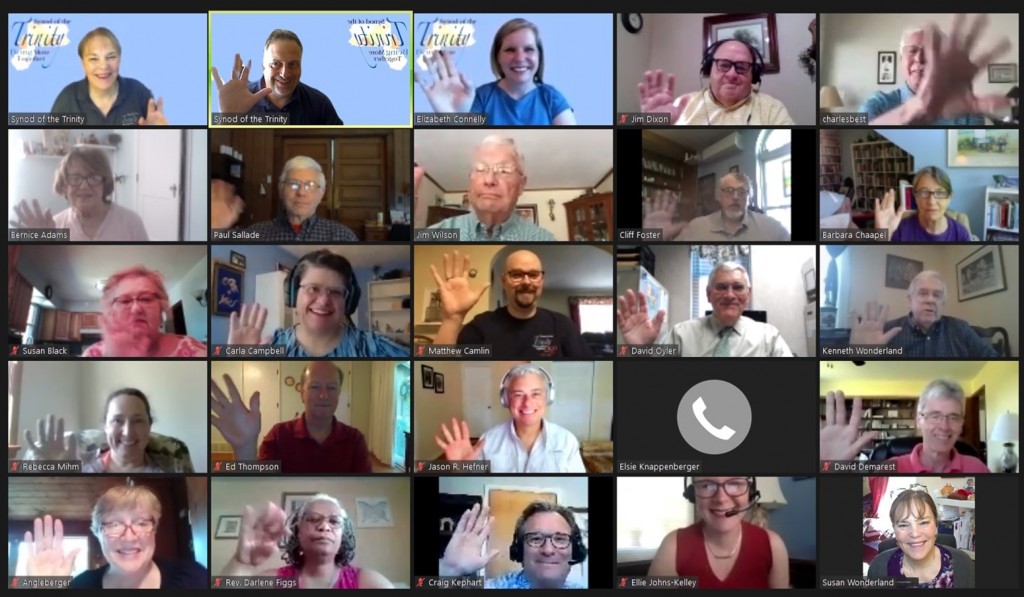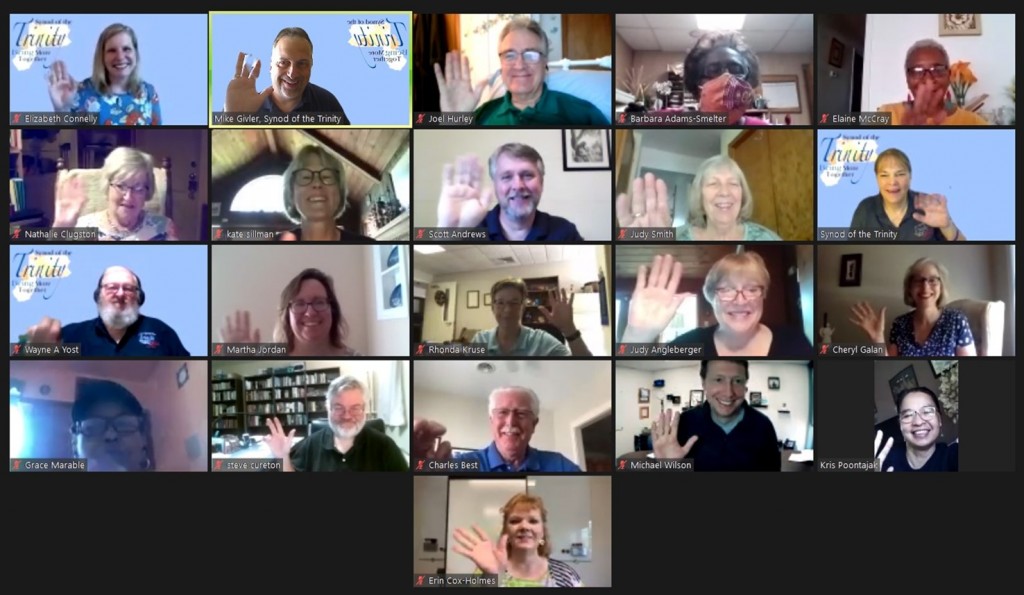
Those in the Western Region gathered for the Synod’s annual Regional Gatherings for Partnership and Networking on June 8.
Each year, the Synod of the Trinity’s Regional Gatherings for Partnership and Networking have a slightly different feel to them. And 2020 was certainly no different.
Coronavirus.
Stay at home.
Protests.
Unrest.
The gatherings unfolded last week in the midst of all of this, and these things framed both the content and the logistics of our gathering.
We opted to hold just two online meetings instead of the normal four face-to-face, breaking people into Eastern and Western Regions. We streamlined the attendees to include Synod commissioners and a leadership representative from each of our 16 presbyteries. We wanted the commissioners to have plenty of space to connect and share.
The smaller groups allowed for MORE personal conversations, and during three breakout sessions, small groups discussed: their own response to staying at home for several months, a Synod-wide survey targeting the experience and well-being of congregational leaders during COVID shutdown, and an introduction to our justice concern for the year, “civility.” Certainly, as the pandemic continues to spread and protests fill our city streets, we are being challenged to face difficult and harsh realities about ourselves and our world that cannot be ignored — it was good to talk.
What follows is a recap of some of our gathering:
- Dr. Graham Standish, the current executive director for Samaritan Counseling, Guidance, Consulting in Sewickley, PA, and the former pastor at Calvin Presbyterian Church in Zelienople, PA, wove together three separate discussions, guiding us to consider the ways we move through a crises. Graham touched on ways that we move, and lead others to move from a place we know, through a crises, and to a new place that is not perfectly clear. He talked about us going “from, through and to.”
“When we lead people to reformation or transformation, there are three things we need to be aware of in each phase,” he said. “When we are moving people out of a particular ‘from,’ we need to begin by helping them to feel safe and also inspire them to feel hope. When we move people through the ‘through,’ we guide them to discover God’s presence and also constantly encourage them to listen for God’s voice.
“And finally, as we move people into a new ‘to’ – this could be opening up the church, this could be moving them to anything – we help to give them the courage to go forward, to form the courage to go forward, and to let them know how brave they’ve been through all of this.”
Synod Communications Coordinator Mike Givler recapped the responses from an April survey (136 responders) that asked church pastors and leadership:
- how has your ministry changed due to the coronavirus
- how have you been exploring and experimenting
- what have you tried that has not gone well
- where are you losing contact, and
- how are you taking care of “you?”

The Eastern Region included seven of the Synod’s 16 presbyteries, which gathered for the annual regional meetings on June 9.
Piggybacking slightly on last year’s conversation at regionals around hate and hate behavior, Synod leadership chose “civility” as the topic of discussion for 2020. We chose it last fall because of the upcoming presidential election and the strong feelings accompanying it — feelings that even then were being expressed and lived out in ways that were harmful to individuals and communities.
For last week’s first conversation around civility, real-time scenarios were considered by the small groups that allowed participants to imagine how they might behave in several settings — to think seriously about how they might stand up to others who were not thinking of community first. Among the questions raised by these scenarios were: should discussions have a winner and is it easier to be rude than civil?
The Synod will be inviting the region to engage in different conversations/trainings that connect with our theme of civility/incivility. Most certainly, as concern and unrest have rocked the country, our inability as a culture to deal with our own racism has become front and center, and we must engage that conversation as a part of this. It is long overdue, and we have invited Synod commissioners to join in planning what form this all may take.
We expect to be inviting the whole region to gather later this summer as we continue.
As a reminder to all and as an expression of our shared faith, during worship we gathered around Psalm 113 — a Psalm of lament that allowed us to express both our pain and our hope, a hope that allows us to move forward trusting God whom we praise!
